THE UNCERTAINTY OF THE PRESENT - CHAPTER III - ABSTRACTION NOT PAINFUL TO WAR
I think the first pictures of war are from 1854 of the Crimean War, which is when the war correspondent was born. Then William Brady wrote a long chronicle of the Civil War in the United States, very well documented with photographs.
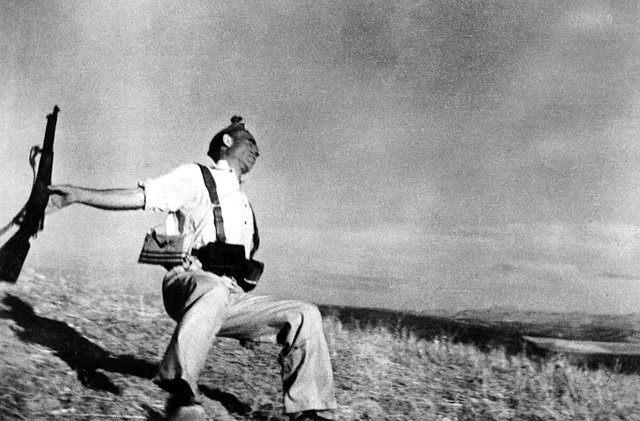
Anarchist militiaman Federico Borrell García falling to the ground shot down. Source
The First World War was documented in cinema. The Second, not to mention, there is a whole film epic of the Second World War. In turn, there are also isolated events, such as Robert Capa's photograph of the combatant who falls in the Spanish Civil War, which can impact so much; that in fact there are some people who said it was a montage. Which I do not believe, why? if he was always in front.
How does the horror of death make you feel such a simple isolated photo, right? We have those terrible photos after the bombs of Hiroshima and Nagasaki, or the children running in terror to the camera, which reminds us a little of that "The Scream" painting.
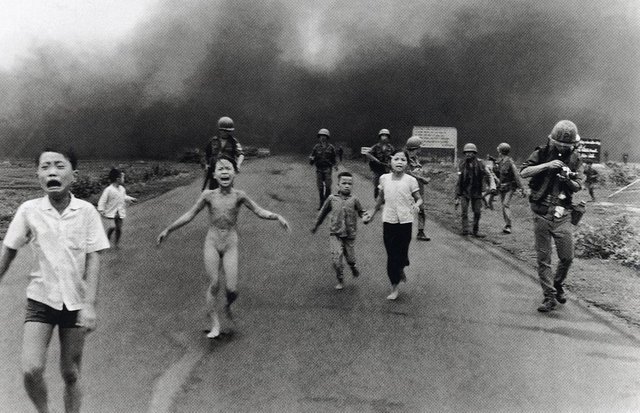
Napalm girl: Phan Thị Kim Phúc - Photographer: Nick Ut - June 8, 1972. Source
The war in Vietnam was intensely graphed in photos and tapes filmed, in fact there are those who say that it was lost both in the fields of Vietnam and in the bosom of American homes.
In short, we have a graphic history of the wars and we arrive at the invasion of Iraq, which is an aseptic war, there are no deaths. The first was a bit surgical but in the second, the invasion of 2003, something happened, the troops were there, but they never showed us the horror of the war.
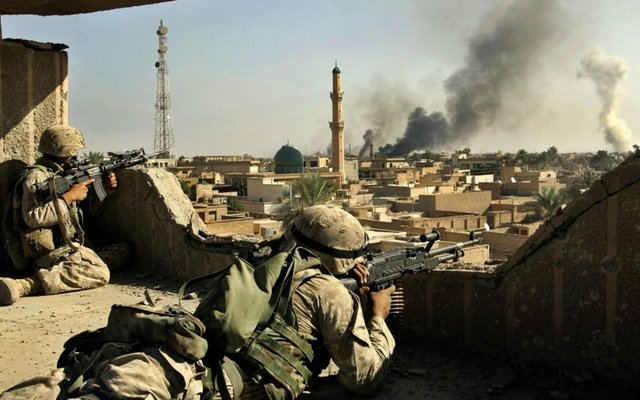
Battle of Karbala, Iraq 2003 Source
Under another lens, Al Jazeera showed the corpses and disasters of the invasion and were criticized by Western chains. In the documentary Control Room a director of Al Jazeera says "they criticize us to teach the dead, this is a war, we have to teach the dead because the dead are ours".
So why, after years of making wars so graphic, graphic journalism now refuses to show us its horror?
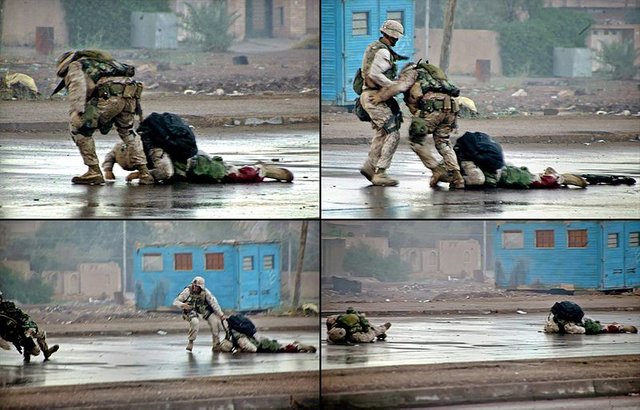
Artillery sergeant Ryan P. Shane while trying to rescue an injured Marine in Fallujah. Source
There was not a television camera in Baghdad in the first Gulf War, which was different from the second one, which ended with an invasion and occupation of the capital. There were some journalists in the capital, in the second, but their movements were very controlled; Most of them had been expelled before the war began; most of them were chased away by the Americans themselves.
That is, the table was cleaned: it is much easier to bomb a city if you do not have people there that you do not want to kill.
The Pentagon had learned a lesson from Vietnam, when they allowed media coverage. There, due to what happened in Vietnam, a generation of independent journalists were forged who go to wars questioning the actions of their own government, but without being considered traitors, with great risks.
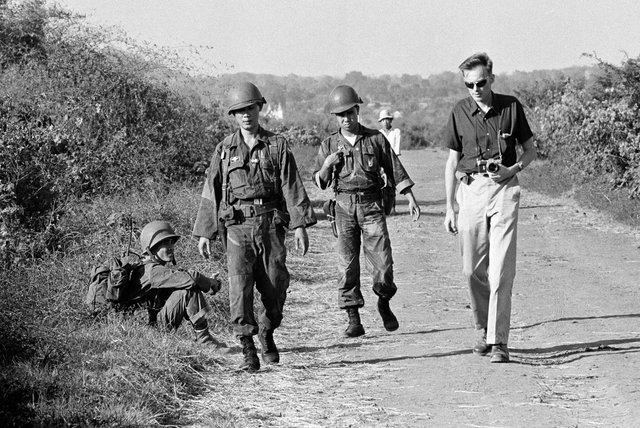
January 1965 - Associated Press The Saigon correspondent, Malcolm Browne, patrol near Binh Hia, in southern Vietnam, with South Vietnamese troops. Source
It is then when the journalist risking his life every second learns to work squarely in what is gray, and not black and white anymore. They stopped using the army uniform to go as war journalists, which was what happened even in Vietnam or earlier in Korea. Some even carried weapons. And it is that even until Vietnam there was very little questioning: the wars were patriotic.
But Vietnam begins to be the great troublemaker, because it was no longer a good war, but it lasted thirteen years. Then there was a generation that was at the beginning with the same head that had covered the Second World War and Korea. But by the end of the war, American society had been broken. We had the counterculture and that had already gone deep. Then the first outbreaks of independence were raised among the press that went to war.
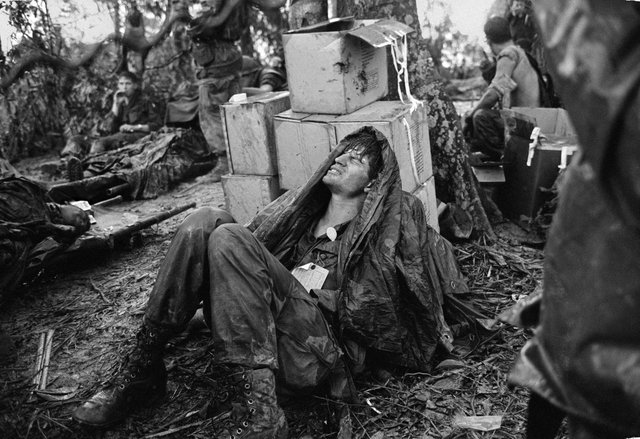
An American paratrooper wounded in the battle for Hamburger Hill awaits a medical evacuation at a base camp near the border with Laos on May 19, 1969. Source
For its part, the Pentagon was traumatized by what they considered the defeat in Vietnam caused by the media, because it was the first televised war. Every time they counted corpses, which was always at dinner time, the American people were traumatized. They became aware of what the cost of war was, and they never wanted to repeat it again.
What was the next American war after Vietnam?
They were adventures, that is, they were first concealed. All in the 80, with the exception of Granada in 83 and then Panama in 89. But they were short wars, easily salable in a dark American generation that already forgot about Vietnam.
And in fact during the whole decade of the 80s there were films in Hollywood of Chuck Norris and Rambo, in which the reading of Vietnam was totally revisionist. They were not like Apocalypse Now and others of self-questioning, of the end of the 70s, but were of revanchism, ultrapatriotism.

According to the Guinness Book of World Records of 1990, Rambo III is the most violent film ever recorded until then: 221 violent acts and more than 108 fatalities. Source
Chuck Norris and Sylvester Stallone eager to win the war and save our young captives in the jungles for those evil ones, all the movies were like that.
Those films forged a generation that feels nothing. That is, he feels no guilt, no moral responsibility, nothing because of what happened in Vietnam.
Then at the end of the 80s the USSR falls, and a triumphalism of war is repeated: "We were right, all this time those who questioned in the 60s because they were smoking too much monte and other herbs, that is, they were fools We were right."
In the Invasive War of 2003, it is released again, the encystment of journalists in the ranks of the American troops and it works. Many of the journalists of past generations, unilateral, independent and questioning are left out, observing the events with a critical eye, but there is also a new generation that goes in the ranks of believers in the warmongering discourse.
On September 11, 2001, it renewed an ultra-nationalist, paranoid, xenophobic and isolationist spirit on the part of many Americans. Many were willing to believe anything, for a time and that in a war clothes journalists. On the other hand, in the mainstream media there has been a consolidation and monopolization of the 70s here. Now there are a few large communication consortiums. There has been no ultra-censorship, what there is is self-censorship.

George W. Bush Source
There seems to be a contradiction in the terribly stressed spirit. In logical terms one might think that the invasion of Afghanistan had to be televised to give the United States a taste of the taste of revenge. "They did this to us, but look what we did to the Taliban and the people of Al Qaeda" Still, they did not televise that war either.
With this aseptic or surgical wars there is an aspect that is merely linguistic that, through language, eludes the bloody of the new wars and are the euphemisms, of which the most usual is the "collateral damage".
There is from the perspective of power a linguistic, semiotic, merely symbolic methodology of making wars a non-painful abstraction. The historical dynamic has been reversed in recent years by the news perception of many events. They have arranged it in such a way that basically the war is alien, there is a lack of interest in the public. Iraq was a soft noise for the world.
It should be well known that against the hypothetical true reality that the free press should give us around the world, the common citizen has to choose where to unravel reality. Not only the reality, but what is the underlying reality, what is the truth behind this event that is shown or narrated. It is a selection process that makes the world more confusing each day. There is no univocal truth. That is, there is no truth in a sunny direction; behind each event lies a multiplicity of interpretations and truths of the event.
Freud talks about the economy of the psyche.
We have become more selective and there are dangers in that, people tend to retain what interests them most or makes them feel comfortable. So, faced with the flood of information, paradoxically we run the risk of living in a much more polarized world, much more compartmentalized, much more sectoralized, for that same desire for survival, that is very human. Beyond apathy, ignorance, lack of culture, laziness, which are also aspects in the human being and in society.
Consumerism and entertainment is another thing that competes. Entertainment is more dangerous than pure or objective information or that has the ostentation of being objective, which could qualify the traditional press that is obviously left, worn out and is being replaced in competition from several orders. We are in a moment of limbo, in a trance in which both the virtues and the defects of these new competences are apparent.
We are witnessing a trend of democratization of information provided by technology. I hope it is not the lowest common denominator that reigns, but this period serves to go from the most mediocre to the most transparent in terms of information, it is like a process of natural selection.
But, at the same time we have the option of the other binding forms of information. Man seems to respond, I do not know if anthropologically, to a certain degree of morbidity. The war can produce an ambiguity of feelings, it horrifies us but there is also something morbid in the presence of war.

Oliver Stone Platoon Source
There is a certain fascination that horrifies us like that temple in Ancient Greece where they took the children to familiarize themselves with death.
We have a need for events, we have a need to be moved, for better or for worse, or ambiguously for good and for bad.
We need information, we need the presence of certain horrors that do not necessarily awaken our conscience, but rather fascinate us because of their morbidity or because they are alien to us and so we are comforted by our situation by not living under such dangers.
Following Freud in that of the economy of the psyche, the common citizen sometimes needs to retreat, evade, flee from a reality that can be run over.
Aristotle and Plato had two very different positions in relation to tragedy. Plato said that he made the Greeks feeble, stunned them. Aristotle, perhaps, was much more acute, saying that the tragedy was important because it was carried out a process of catharsis in the viewer. He lived the destinies of the drama that was unfolding without dragging the real and painful consequences of what they were seeing.

Yoda in Star Wars Episode II Source
Most of us what we do is choose to hide from the harsh reality. We constantly evade daily the bloody reality of all the conflicts that exist in life, both in the distant life where there are warlike conflicts and around us in the city where we live.
Returning to the political perspective, grosso modo, summarizing very radically the world has been divided into two plots. For one extreme, the part of the world that believes that human rights are those that the West has established as such. But do we really have the right to impose a Muslim who does not cut off a thief's hand? It seems that we pretend to do it. We seem to pretend that human rights are the rights that we, the Westerners, have raised as the prevailing moral norms that should then be global.
But, from a more philosophical Western perspective, yes, it is true, we sit this world in the dock of accused, pointing out its violations or its transgressions to the code of ethics or morality imposed by the West.

Declaration of the Rights of Man Source
It is complex, I know, because on the one hand there is hypocrisy, and there are great contradictions, Who is going to throw the first stone? But, on the other hand, a part of me wants us to talk about human rights, because if we do not talk about human rights, we return to total war.
What is that of establishing a code of conduct in a war? What is war? It is collective murder, organized by countries and, in some way or another, all societies have a way of justifying it, even within our legal or philosophical system.
Maybe human rights worldwide, should be negotiated? To achieve a global consensus, because how to end... Now we are recognizing globalization as such, that is, where it also deprives the opinion of the most disadvantaged countries. The positive part of globalization ?, maybe.
Sometimes I think I will die pessimistic. But, for the moment I am swinging, between pessimism and optimism. But I have seen too much to be truly optimistic or pessimistic... I am realistic... I do not know if it is very naive to put faith in that at least the problems are being analyzed, they are spreading, they are communicating.
Now, for example, there is a great alarm about climate change, of course ecology is much more than climate change, but at least it is being talked about. To the extent that problems are spread (and that is the responsibility of journalism); As the problems spread, we become aware and create pressure mechanisms.
The new generations inspire me optimism, because an important part is conscious or at least interested in knowing more about the problems. They do not feel that their lives are tragically finished. I think having at least notions does not keep them from enjoying their lives, living them. And I think that everyone has a sense of social duty. They share, a code of behavior that goes beyond their person. I want to believe that that inspires confidence.
Let's not forget that the generation of our parents and those before them practiced genocide, not necessarily our parents or grandparents. Maybe they were on the good side, but all participated in a totalitarian deeds that included genocide, total war and, finally, the creation of the atomic bomb. Thank you very much how were they and then we to assimilate that?, have you taken the time?
The sentence assigned to Oppenheimer, when they launched the bomb was:
"Science has known sin".
Previous articles
The Uncertainty of the Present - Prologue
UNCERTAINTY OF PRESENT - CHAPTER I - WHAT IS THE SENSE OF CONSUMPTION?
THE UNCERTAINTY OF PRESENT - CHAPTER II - THE NEED TO BE VALUED
I Am the One I Am - I Am My Teacher
Instagram | Facebook | Linkedin
Monday, May 21, 2018
Alberto J. Tang H.

This is interesting on many levels. However, I find many of the ideas included to be controversial, to say the least.
That is what it is, to seek between the controversial the truth of each point of view, for the best and most accepted for the majority, not just a periphery of the poses. Thank you very much for taking the time to read, I think it's the longest article I've written so far, looking to make it a little shorter, for more convenience and simplicity.
İ like it. I am waiting with more excitement @albertotang .
Have a nice day :)
Thank you very much for the time of reading brother. If you like it, I trust you will like what is coming.
Congratulations. Your post is randomly selected to resteem and upvote!
Please consider upvoting this comment and following me to better support the community.
Regards, @resteemdone
Followers count: 383
you have to be truly insensitive to not feel pain from the war